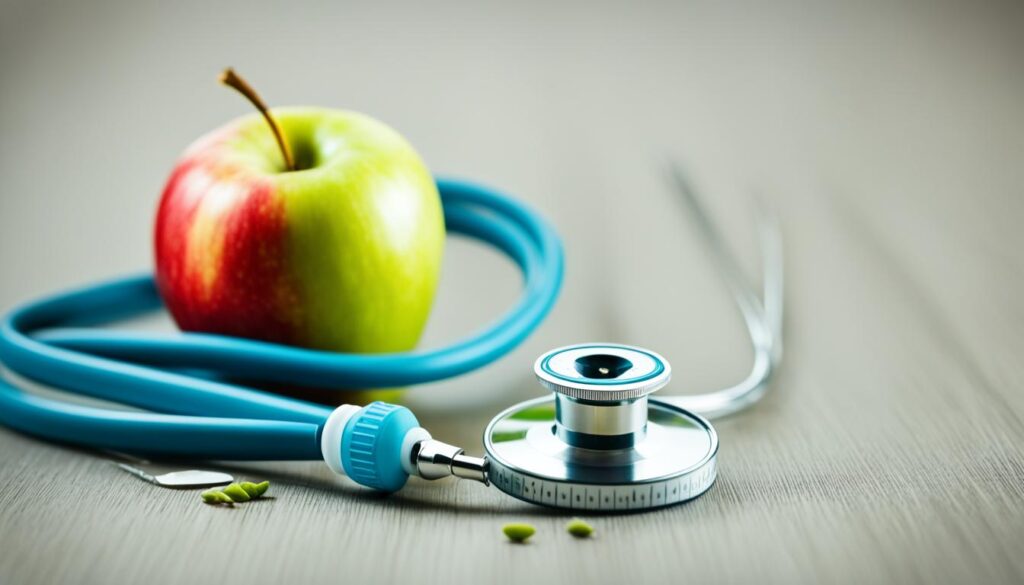Think of a health crisis happening in your body without any warning. This is more common than you’d think in heart issues. But with careful awareness, you could save your heart. Get ready to learn the secrets of early heart issue detection.
Key Takeaways
- Cardiovascular problems can manifest in unexpected ways, beyond the classic chest pain.
- Recognizing atypical symptoms like jaw or back pain, indigestion, and nausea can be crucial for early intervention.
- Silent heart attacks pose a stealthy threat, often going unnoticed until it’s too late.
- Understanding your personal risk factors, such as age, gender, and underlying conditions, can empower you to take preventive action.
- Adopting a heart-healthy lifestyle, seeking regular checkups, and utilizing advanced screening tests can significantly improve your cardiovascular well-being.
Not all heart problems come with obvious warning signs
Many think that heart issues always have clear signs like chest pain or breath problems. But sometimes, heart problems show up in small, unexpected ways. This makes them easy to miss. Knowing about these atypical symptoms is key for stopping cardiovascular disease early.
People often believe heart attacks must feel like a heavy weight on the chest. But, silent heart attacks can happen without any chest pain. You might feel jaw or back pain, or even just a bit of indigestion. These don’t seem serious at first glance.
Heart problems don’t always come with the typical chest pain or shortness of breath. Sometimes, the signs can be much more subtle and easy to miss.
Also, heart issues like issues with the valves or irregular heartbeats can seem like other problems. Fatigue, feeling light-headed, or leg swelling can point to a heart problem.
Being aware and alert is crucial in dealing with silent heart attacks and unusual symptoms. Learning about all the warning signs can help you notice problems early. This way, you can get help before things get worse.
Taking a proactive stand on heart health is a must. Regular check-ups, tests, and living healthily can reduce cardiovascular disease risks. By staying up-to-date and listening to your body, you can manage your heart health well. This ensures any problems are handled fast.
Atypical Symptoms Recognizing the Unexpected
Heart disease doesn’t always show in the expected ways. It’s not just chest pain. The body can show other signs that point to heart issues. It’s important to know these different signs for early treatment.
Jaw or Back Pain: A Silent Cue
Not all heart problems start with chest pain. Sometimes, discomfort in the jaw or back is the first sign. This pain might not seem related to heart health. But it can be a way your body is telling you something’s wrong with your heart. It’s easy to miss these signs, which can lead to delays in heart disease treatment.
Indigestion or Nausea More than Stomach Trouble
Feeling like you have indigestion or nausea can also be related to your heart. Even though these symptoms often point to stomach issues, they can also signal heart problems. Sometimes, these signs are the only warning you get before a silent heart attack.
It’s important to listen to your body and notice any unusual symptoms. These signals might not directly point to heart issues. But staying aware and educated can help you catch signs of heart disease early. This way, you can get the right medical help to protect your heart.

Paying attention to unusual bodily sensations, even if they don’t seem heart-related, can be the difference between a timely diagnosis and a potentially devastating outcome.
Silent Heart Attacks A Stealthy Threat
Many think chest pain means a heart attack. But silent heart attacks, often unseen, are just as serious. They sneak up without clear symptoms that demand medical help.
These secret heart issues happen when the heart gets damaged. Often a blockage in the arteries is to blame. But you won’t always feel the classic heart attack signs. Signs might be subtle, like tiredness or light-headedness, easily waved off as not serious.
| Symptom | Description |
|---|---|
| Fatigue | Unexplained, persistent tiredness that doesn’t improve with rest. |
| Shortness of Breath | Feeling winded during routine activities or at rest. |
| Nausea or Indigestion | Digestive discomfort that may be mistaken for a stomach issue. |
| Dizziness or Lightheadedness | Feelings of unsteadiness or loss of balance. |
Silent attacks are dangerous for their hidden nature. Not seeing clear symptoms can mean delay in getting help. This can let the heart’s damage get worse, possibly leading to deadly situations later on.
Knowing the subtle signs and getting help fast is crucial. It can mean the difference between coming back strong or facing a bad situation. So, being aware of different heart attack signs is key. And acting quickly can save lives.

Staying informed about the subtle signs of a silent heart attack can be the key to catching these stealthy threats before they escalate.
Risk Factors Uncovering Hidden Vulnerabilities
Cardiovascular disease is serious and has many causes. Some risk factors, like your age, gender, or if you have diabetes or high blood pressure, aren’t always obvious. But, it’s key to know how they can affect your heart’s health. Let’s look into these less-known risks and see how they might make us more likely to have heart issues.
Age and Gender Playing a Role
As we get older, our chances of getting heart disease go up. The heart and blood vessels change as we age, becoming more fragile. Men are at a bigger risk for heart attacks and related problems earlier in life, compared to women.
Diabetes and High Blood Pressure Dangerous Duo
Diabetes and high blood pressure are a dangerous mix for the heart. Diabetes can harm blood vessels and nerves, upping the threat of heart attacks and strokes. High blood pressure forces the heart to work harder, which can lead to heart issues.

Knowing and managing these hidden risks is vital for your heart health. By being alert and making changes to your habits, you can lower your risk of heart disease. This puts you in charge of keeping your heart well.
Preventive Strategies Safeguarding Your Heart
To keep your heart healthy and prevent disease, focus on two main things: exercise and a good diet. When you exercise and eat well, you create a strong barrier against heart problems.
Exercise and Diet Keys to Cardiovascular Health
Moving your body regularly is a key part of heart disease prevention. Doing different exercises, like walking or lifting weights, makes your heart stronger. It also helps blood flow better and lowers the risk of high blood pressure and heart issues. Pairing exercise with a diet full of the right nutrients builds a strong defense against heart disease.
- Aim for at least 150 minutes of moderate-intensity aerobic activity or 75 minutes of vigorous-intensity aerobic activity per week.
- Incorporate a variety of exercises, such as brisk walking, swimming, cycling, or yoga, to engage different muscle groups.
- Prioritize a diet rich in fruits, vegetables, whole grains, lean proteins, and healthy fats to nourish the heart and support overall well-being.
- Limit intake of saturated and trans fats, added sugars, and sodium to reduce the strain on the cardiovascular system.
Making exercise and healthy eating a daily habit protects your heart. You significantly improve your odds of good heart health in the long run.
The greatest wealth is health. Virgil

Choosing a heart-healthy lifestyle with lots of exercise and a good diet is a smart way to keep heart disease away. Making these choices means you’re in control of your heart’s health. You’ll live a healthier, more active life.
Early Detection Catching the Signs Early
When talking about heart health, catching issues early is crucial. This allows people to act before things get worse. Going for regular checkups and heart screenings is key. They find problems that might otherwise not be seen.
Early signs of heart issues are often not obvious. Not everyone feels chest pain. Some feel jaw or back pain, indigestion, or nausea. It’s important to know these signs. Recognizing them early can make a big difference.
Many tests can spot heart issues early. Tests like electrocardiograms ECGs, stress tests, and imaging scans are very helpful. They show problems with the heart and arteries. This helps doctors act fast.
Early detection is essential for ensuring the best possible outcomes when it comes to heart health. The more we can uncover about the state of our cardiovascular system, the better equipped we are to take proactive measures and maintain a strong, healthy heart.
Working closely with doctors is vital to good heart health. Doing regular checkups and heart tests is a smart move. They can catch heart disease early. This means treatment is more effective and complications are less likely.

Focusing on your heart health early can make a big difference. Know the signs and use new tests to stay on top of things. This way, you can actively protect your heart for a healthier life.
Lifestyle Changes Empowering Your Heart
Taking steps to protect your heart is key to better cardiovascular health. Our daily choices matter a lot, as do early diagnoses and medical help. The core of improving our health is learning how to handle stress. This is essential for a healthy heart lifestyle.
Stress Management: Calming the Storm
Stress over time can hurt our heart, leading to many heart problems. We should use stress-relief methods every day. This way, we can lower the harm stress does to our hearts.
- Mindfulness and meditation: Doing these practices often can help your heart. They lower blood pressure and help your heart’s health overall.
- Physical activity: Moving your body not only helps your heart but also makes you less stressed. It makes you feel good as chemicals in your body change.
- Work-life balance: Balancing work and life is important. It reduces stress and helps your heart stay healthy.
- Social connections: Having good friends and family around helps with stress. It’s good for your heart too.
By using these stress-coping methods, people can make their hearts stronger. This helps avoid heart issues and makes your heart healthier and tougher.
Stress management is essential for living well and keeping your heart healthy.
| Stress Management Technique | Potential Benefits for Cardiovascular Health |
|---|---|
| Meditation and Mindfulness | Lowered blood pressure, reduced inflammation, improved heart rate variability |
| Regular Exercise | Strengthened heart muscle, improved blood circulation, reduced risk of heart disease |
| Work-Life Balance | Reduced stress levels, improved mood, better sleep quality |
| Cultivating Social Connections | Enhanced emotional well-being, reduced cardiovascular risk factors |

Stressing less and living healthy is connected with a strong heart. This affects our heart’s chances of working well without problems.
Medical Checkups Partnering with Professionals
Regular medical checkups help keep our hearts healthy. By teaming up with experts like cardiologists, we can take charge of our heart’s health. These checkups look deep into our cardiovascular health. They find hidden problems early, which means we can start the right treatments soon.
Advanced Screening Tests Unveiling Hidden Risks
There’s more to check than just the basics. Advanced tests can find risks we might not see on the surface. Medical pros often suggest these tests to learn more about our heart health. They can find signs of heart disease before it gets worse.
There are many types of advanced tests, including:
- Echocardiogram: A safe, painless ultrasound to check the heart’s health.
- Stress test: Shows how the heart handles exercise, finding any problems.
- Coronary artery calcium scoring: A special CT that shows heart disease risks.
- Cholesterol and blood pressure screenings: Tests key heart health signs for early help.
Adding these tests to regular checkups gives a clear picture of heart health. This helps work together with healthcare pros to tackle issues early. It also helps manage risks better.
| Advanced Screening Test | Purpose | Benefits |
|---|---|---|
| Echocardiogram | Evaluate the structure and function of the heart | Helps find heart valve or muscle problems early |
| Stress Test | Measure the heart’s response to physical activity | Spots blockages or heart function problems |
| Coronary Artery Calcium Scoring | Quantify the amount of calcium buildup in the coronary arteries | Shows early signs of heart disease risk |
| Cholesterol and Blood Pressure Screenings | Measure key indicators of heart health | Enables early action and risk management |
Staying proactive about our heart health is important. Teamwork with healthcare pros and regular checkups are crucial. They help spot heart disease early and keep our hearts strong and healthy.
Heart Healthy Habits A Lifelong Commitment
Making your heart healthy is a long-term goal, not something quick. It involves adopting habits that are good for your heart for life. We will look at key ways to keep your heart healthy through preventive cardiology.
Embrace Regular Physical Activity
Heart-healthy lifestyle starts with staying active. Try to do 150 minutes of medium exercise or 75 minutes of hard exercise every week. Walking fast, swimming, biking, and lifting weights all count. Doing it regularly is important for your cardiovascular health.
Nourish Your Heart with a Balanced Diet
Your diet impacts your heart-healthy lifestyle significantly. Eat lots of fruits, veggies, whole grains, lean meats, and good fats. Cut down on bad fats, sugar, and salt to keep your heart in top shape.
Monitor Your Heart Health Indicators
Stay on top of your heart health by checking your blood pressure, cholesterol, and glucose. Working with your doctor is key. They can help you understand risks and plan for a heart-healthy lifestyle.
The best time to plant a tree was 20 years ago. The second best time is now. Chinese Proverb
Commit to keeping your heart fit all your life. This means being active, eating well, and getting checked regularly. These steps guard your heart and help you live a happy, healthy life.
| Heart Healthy Habit | Benefits |
|---|---|
| Regular Exercise | Improves heart function, lowers blood pressure, and reduces the risk of heart disease. |
| Balanced Diet | Supports healthy cholesterol levels, blood sugar control, and overall cardiovascular health. |
| Monitoring Health Indicators | Enables early detection and management of potential heart-related issues. |
Silent but Significant The Impact of Subtle Signs
Heart health is critical, looking at the little things matters. Major chest pains and shortness of breath point to heart problems. But silent heart attack symptoms and less obvious heart disease signs are just as key.
Ignoring cardiovascular disease signs can be dangerous. They could lead to serious issues if not caught early. Symptoms like jaw or back pain, or constant indigestion, might show a bigger problem.
Dismissing minor symptoms is a big error, says Dr. Sarah Johnson. These silent signs could be the first hint of a big issue.
It’s vital to notice and act on subtle heart signs. By being alert, we can stop big heart issues early. Remember, taking steps now can prevent severe problems later.
Jaw or back pain, and ongoing indigestion are signs not to overlook. Understanding the value of addressing even tiny heart symptoms is crucial. It lets people protect their heart health and avoid big health scares. Your heart being in good shape is the start of a long, happy life.
Conclusion: Staying Vigilant and Informed
This journey into heart health has shown us the importance of being alert and knowing the signs of heart problems. Not all issues are obvious, so staying aware, and working with your doctor is key.
Detecting heart problems early is crucial. By learning about symptoms, risks, and how to prevent heart issues, you can protect your heart. Small steps now will pay off greatly later.
This is a call to action to always be watchful and informed about your heart health. With effort and a positive attitude, you can keep your heart strong, guiding your life with strength. Remember, everything begins with a healthy heart.





